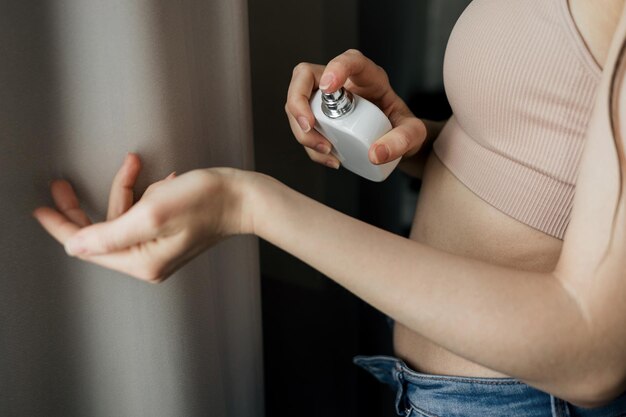Is Aluminum in Deodorant a Cause for Cancer Concerns?
In the pursuit of personal hygiene, deodorants and antiperspirants have become essential for many individuals aiming to stay fresh throughout the day. However, a lingering concern has captured the public's attention: Could the aluminum compounds in these products potentially cause cancer? Join us as we unravel this topic, presenting insights into aluminum's role, exploring research findings, and providing you with meaningful guidance.
Understanding Aluminum in Deodorants
Aluminum compounds, such as aluminum chlorohydrate and aluminum zirconium, are commonly used in antiperspirants—not deodorants. They work by temporarily blocking sweat pores, thereby reducing perspiration and, consequently, body odor caused by bacterial activity on sweat. These are the compounds under scrutiny, sparking debates about potential health risks.
How Do Aluminum-Based Antiperspirants Work?
The aluminum salts in these products form a temporary plug within the sweat duct, reducing the amount of sweat that reaches the skin's surface. This is different from deodorants, which only mask or neutralize odor without affecting sweat production.
The Cancer Debate: What Does Science Say?
The concern surrounding aluminum-based antiperspirants relates mainly to breast cancer. Here's a closer look at the current scientific understanding:
Studies and Scientific Research
Breast Proximity Concerns: The use of antiperspirants close to the breast area has led to hypotheses about potential risks. Some fear that aluminum compounds can be absorbed through the skin and cause hormonal effects similar to estrogen, known to promote the growth of breast cancer cells.
Lack of Conclusive Evidence: Despite these theories, multiple studies have not found definitive evidence linking aluminum exposure from antiperspirants to breast cancer. The American Cancer Society and the National Cancer Institute indicate no substantial evidence to support claims that these products increase cancer risk.
Biological Plausibility: While some studies suggest biological mechanisms through which aluminum could influence cancer risk, such as genotoxic effects or DNA damage, these are not yet proven in the context of antiperspirant use.
Beyond Breast Cancer: Other Health Considerations
Besides cancer, aluminum has been examined for its potential role in other health issues:
Alzheimer's Disease and Neurotoxicity
Alzheimer's Concerns: There are historical concerns about a link between aluminum exposure and Alzheimer's disease. However, current consensus suggests that regular exposure to aluminum, such as through antiperspirant use, is unlikely to contribute significantly to Alzheimer's risk.
Skin Irritation & Allergies: Some people may experience skin irritation or allergic reactions to aluminum compounds. In such cases, switching to alternative products may alleviate symptoms.
Navigating Choices: Aluminum-Free Alternatives
With the growing market for natural and aluminum-free products, more options are available for consumers seeking alternatives:
Options and Ingredients
Natural Deodorants: Generally focus on neutralizing odor without affecting sweat production. Ingredients such as baking soda, essential oils, and plant-based substances are popular.
Alternative Antiperspirants: Some products utilize different compounds, like potassium alum or more naturally derived elements, to provide sweat control sans aluminum.
Evaluating Your Choices
Personal Preference: Opt for what aligns with your comfort and skin sensitivity.
Label Savvy: Check labels and understand ingredient lists to ensure you're getting the product that's best for your needs.
Empowering Your Decision-Making Process
Consumers are increasingly aware of ingredient safety and environmental impact. Here’s how to make informed choices:
Balanced Information: Stay informed with reliable sources. Peer-reviewed studies and official health organizations offer grounded insights rather than sensationalized claims.
Trial and Observation: Test different products if you're concerned about specific ingredients, noting any changes or reactions.
Sustainability Considerations: Evaluate product packaging and ingredient sourcing if environmental factors are of concern.
In Summary: Decoding the Complexities
The possible link between aluminum in antiperspirants and cancer, especially breast cancer, is a topic shrouded in speculation rather than concrete science. Currently, evidence does not substantiate a direct connection, though ongoing research is crucial for clarity.
Key Points to Consider
- No Strong Link: While concerns persist, scientific consensus hasn't confirmed antiperspirants as a cancer risk.
- Individual Reactions: Pay attention to your body's reactions, as sensitivity varies.
- Consumer Empowerment: Explore the plethora of available products, taking comfort and safety into account.
Practical Guidance Summary 🌟
- Choose Comfortably: Opt for products that align with personal health preferences. ✔️
- Stay Informed: Keep up with credible research and recommendations. 📚
- Consider Alternatives: Explore natural or aluminum-free products if preferred. 🌿
- Monitor Sensitivity: Observe how your skin reacts to different ingredients. 🧐
Ultimately, making health choices should empower and reassure rather than alarm. Equip yourself with knowledge, and don't hesitate to consult healthcare professionals for personalized advice if needed.

Related Articles
- Are Breast Cancer Lumps Painful
- Are Chills a Sign Of Cancer
- Are Colon Spasms a Sign Of Cancer
- Are Lytic Lesions Always Cancer
- Are Polyps Cancer
- Can a Blood Test Detect Cancer
- Can a Ct Scan Detect Cancer
- Can a Dexa Scan Show Cancer
- Can a Gastric Emptying Scan Show Cancer
- Can a Lung Biopsy Cause Cancer To Spread
